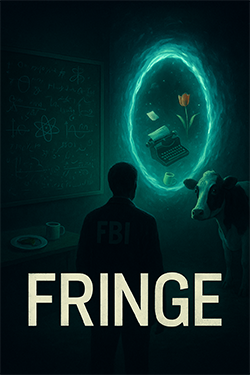
Fringe: A Surreal Metaphysical Expedition into the Absurdity of Human Curiosity
Ah, Fringe – the show that dares to explore the mind-bending, sanity-challenging edges of the universe with a fine blend of science fiction and government conspiracy. If there’s one thing the show teaches us, it’s that the boundary between genius and madness is, well, just a thin, often invisible line, one that, when crossed, plunges you into the delightful mess of molecular disruption and alternate dimensions.
At its core, Fringe raises the perennial philosophical question: How far is too far in the pursuit of knowledge? The answer, it seems, is “never too far”, as long as you’ve got a talented team of eccentric scientists, a beleaguered FBI agent, and an unhealthy obsession with genetically altered chickens. The show indulges in the age-old theme of humanity’s drive to understand the unknown, though the unknown frequently includes a parade of grotesque mutations, psychotic experiments, and, of course, the occasional reality-warping device.
Yet, within its ludicrousness, Fringe beckons us to confront the existential question of why we seek to understand the universe at all. Is it to conquer the limits of reality, or is it merely the manifestation of an insatiable, sometimes irrational desire to defy the natural order? As Walter Bishop’s exploits in his search for answers show, perhaps we should be more concerned with the cost of this insatiable curiosity, because some knowledge, as it turns out, should have stayed locked away in the recesses of the mind. But then again, that wouldn’t make for a particularly compelling TV show, would it?
